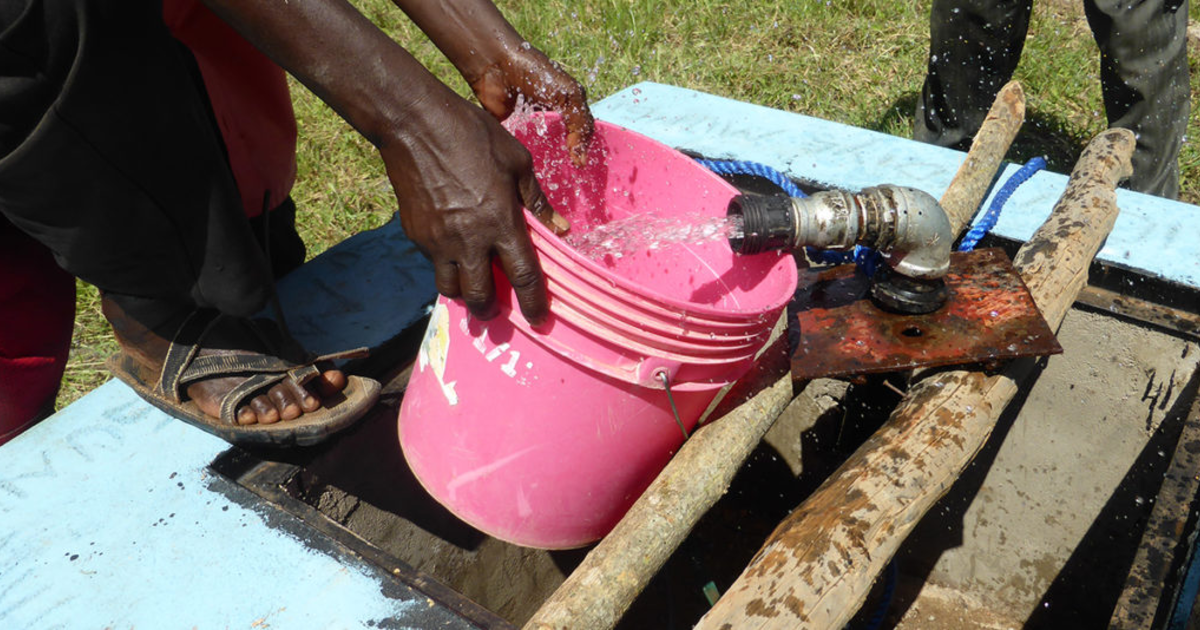Nesten halvparten av befolkningen i de rurale områdene i Tanzania er uten tilgang tilsikre vannkilder. Befolkningen må bruke mye tid på å samle vann, og drikkevannsbårnesykdommer forårsaket av forurenset vann er vanlig. Tilgang til en forbedret vannkilder essensielt for å sikre økonomisk, miljømessig og sosial bærekraft i landet.
Endringer i nedbørsmønstre og rask befolkningsvekst påvirker en allerede anstrengtvannforsyningssituasjon i Tanzania. Tidligere har regnvann vært viktig som vannkildemange steder. På grunn av klimaendringer er det økt behov for å kunne bruke grunnvann. Grunnvann påvirkes lite av ustabile nedbørsmønstre og blir dermed sett på somen pålitelig vannkilde.Grunnvannet må ha tilstrekkelig kapasitet og være av tilfredsstillende kvalitet forå være en pålitelig vannkilde.
Denne oppgaven evaluerer grunnvannets pålitelighet i distriktene Hanang, Mbulu og Mkalama i Tanzania i form av tilgjengelighet, forvaltningog kvalitet.Tilstrekkelig vanntilgang ble undersøkt basert på tilgjengelighet og forvaltning avgrunnvann.
Fjernovervåking av grunnvannsnivået viste at tilgjengeligheten av grunnvann er stabil og ytterligere utvinning kan utføres uten risiko for å redusere grunnvannsstanden.
Resultatene viser at folks tilfredshet med vanntjenestene ikke reflekteres av hvor fornøyde de er med vannforsyningsorganisasjonene (COWSO), men er påvirket av andre faktorer. Befolkningens tilfredshetsnivå påvirkes sterkt av avstanden til brønnene og om de må bruke en lokal brønn i den tørre årstiden. Derfor bør innsatsen videre fokusere på å gi trygt vann til avsidesliggende områder, spesielt i den tørre årstiden.
Når det gjelder kvalitet, gir høye fluorinnhold i grunnvann helsemessige utfordringeri Tanzania. Denne oppgaven undersøker potensialet til forskjellige fluoradsorbenter.
ce H2SO4 behandlet aktivert aluminium har høy fluoradsorpsjon, men er for kostbar. Adsorpsjon med moringa- og neemblader ble undersøkt som et billig alternativ.
Denne studien fant at adsorpsjon med moringa og neemblader ikke er egnet.
Denne oppgaven viser at det er nok grunnvann i distriktene Hanang, Mbulu ogMkalama i Tanzania, men at det er problemer med forvaltningen slik at tilgjengeligheten for befolkninger er ustabil gjennom året.
Ønsker du å lese hele oppgaven kan denne lastes ned i menyen til høyre.
In 2020, NTNU students Ingebjørg and Nina completed their Meaningful Master with field assignments in Tanzania, in collaboration with 4 Corners Cultural Program (4CCP)
Almost half of the population in rural areas of Tanzania is without access to safe water sources. The population has to spend a lot of time collecting water, and drinking waterborne diseases caused by contaminated water are common. Access to an improved water source essential to ensure economic, environmental and social sustainability of the country.
Changes in rainfall patterns and rapid population growth are affecting a strained water supply situation in Tanzania. In the past, rainwater has been important as a source of water in many places. Due to climate change, there is an increased need to use groundwater. Groundwater is minimaly affected by unstable rainfall patterns and is thus seen as reliable source of water. Groundwater must have sufficient capacity and be of satisfactory quality to be a reliable source of water.
This task evaluates the reliability of groundwater in Hanang, Mbulu and Mkalama districts in terms of availability, management and quality. Sufficient water access was assessed based on groundwater availability and management.
Remote monitoring groundwater levels showed that the availability of groundwater is stable and further extraction can be carried out without risk of reducing groundwater levels.
The results show that people's satisfaction with water services is not reflected by how satisfied they are with the water supply organizations (COWSO) but is influenced by other factors. The satisfaction level of the population is strongly influenced by the distance to the wells and whether they have to use a local well during the dry season. Therefore, further efforts should focus on providing safe water to remote areas, especially during the dry season.
In terms of quality fluoride content in groundwater presents health challenges in Tanzania. This thesis examines the potential of various fluoradsorbents.ce H2SO4 treated activated aluminum has high fluorad adsorption but is too costly. Adsorption with moringa and neem leaves was investigated as a cheap alternative.
This study found that adsorption with moringa and neem leaves is not suitable.
This task shows that there is enough groundwater in the districts of Hanang, Mbulu and Mkalama in Tanzania, but that there are management problems such that availability for populations is unstable throughout the year.
If you want to read the entire thesis it can be downloaded from the menu on the right.


